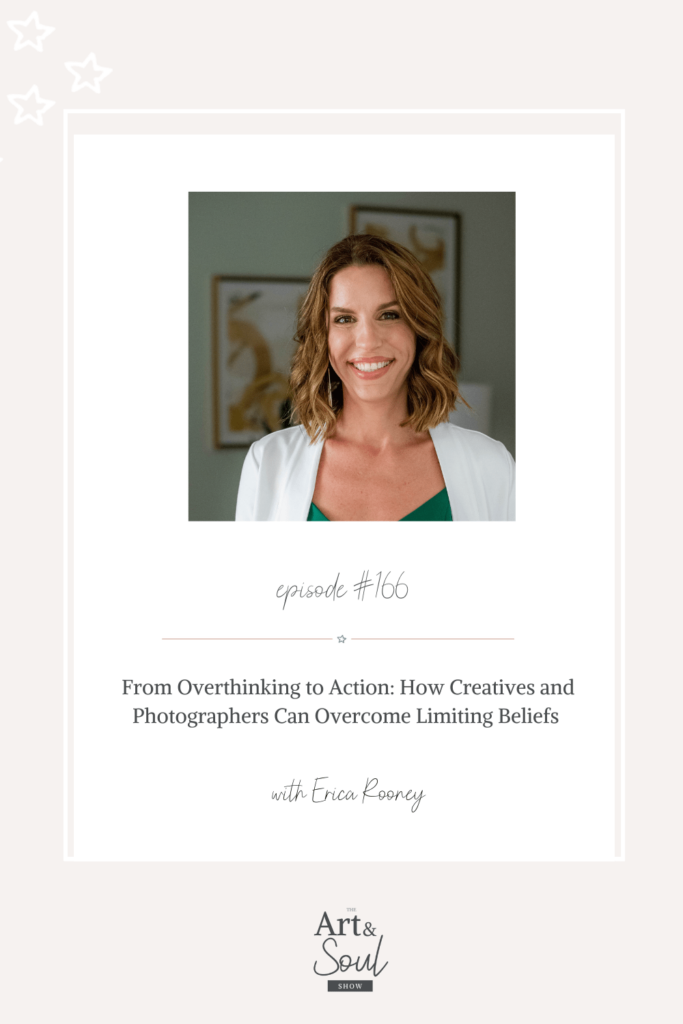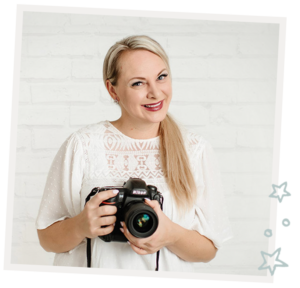From Overthinking to Action: How Creatives and Photographers Can Overcome Limiting Beliefs with Erica Rooney
As entrepreneurs, we probably have more limiting beliefs than we care to admit. Today’s guest calls these beliefs that hold us back “sticky floors” and she has made it her mission to help women identify theirs, and, in turn, build a life filled with purpose and passion.

In this episode, I’m chatting with Erica Rooney, executive coach, chief people officer, and more, and she’s sharing how to break free of limiting beliefs by taking action instead of overthinking and by leading with your core values and authenticity. She also has great tips for staying true to yourself (and learning to say no).
This episode digs into aligning purpose and passion in your business and, most importantly, cleaning up your sticky floors so that you can build the confidence necessary for the success that you desire.
What’s in this episode:
- [04:02] What “sticky floors” are, according to Erica, and how you can identify yours
- [11:07] How Erica coaches her clients to stop overthinking and start taking action, and the benefits of self-compassion
- [18:40] How to overcome the fear of showing up authentically, and how to identify your core values (and understand that they can shift)
- [24:36] Advice for ditching people-pleasing tendencies, tips for building confidence, and how rigid goals can lead to self-sabotage
- [35:19] How to have more fun in your business
Tune in to this episode with Erica Rooney to get inspiration for replacing your limiting beliefs with confidence and authenticity!
SUBSCRIBE: Apple Podcasts | Spotify | Stitcher
Want to put an end to awkward moments in your photo sessions and create genuine connection? Download The Storyteller’s Toolkit today, featuring 200+ emotive photography prompts, so you’re never left wondering what to say.
Resources Mentioned
This Naked Mind by Annie Grace
The Untethered Soul by Michael A. Singer
Meet Erica
Erica Rooney is a Keynote Speaker, Executive Coach & HR Consultant, Chief People Officer and host of the Podcast, From Now to Next.
She is on a mission to help women get seen, get heard, and GET PROMOTED by breaking out of their “sticky floors”, and busting through the glass ceiling, to live a life filled with purpose and passion.
As a top Culture Expert, Erica invigorates and educates organizations through change, driving a positive experience for employees, and guiding executives through the process of change to lead to massive success.
Connect with Erica
Follow From Now to Next on Instagram
Like From Now to Next on Facebook
Did this episode with Erica Rooney inspire you to implement ways to build your confidence? Check out this episode from Maria Arellano that offers you even more insight on finding alignment in your business!
Transcript
[00:00:00] Erica Rooney There is always going to be that piece that you are not going to love about owning and operating a business. And I hope one day we can all be the Oprahs of the world, right? Where you make enough money that you can pay people to do the things you don’t want to do. But the majority of us got to put a little time and a little effort into the things that we don’t love. But when I heard that research from Mayo Clinic and they told me the 20%, it almost gave me permission to not love all aspects of the thing I’m supposed to be passionate about.
[00:00:36] Lisa DiGeso Welcome to the Art and Soul Show where we dive into heart opening chats on photography, business life and that messy in between. I’m your host, Lisa DiGeso, a mom, a photographer and entrepreneur, and I’ll be sharing honest conversations and advice for photographers with insight on mindset, entrepreneurship and creativity. The goal of this podcast is for you to be able to gain insights and strategies that will get you real results. Because let’s face it, having a photography business can be lonely, but it doesn’t have to be. This is the place you can go when you need a boost of encouragement, a kick in the pants and inspiration to pick up your camera. This is the art and soul show. Hello, my beautiful friends. Welcome back to the show today. I’m super excited to dive into today’s conversation with Erica Rooney. Erika is a keynote speaker, executive coach, and HR consultant, chief people officer and host of the podcast From Now to Next. She’s on a mission to help women get seen, get heard and get promoted by breaking out of their sticky floors and busting through the glass ceiling to live a life filled with passion and purpose. As a top culture expert, Erica invigorates and educates organizations through change, driving a positive experience for employees and guiding executives through the process of change to lead to massive success. Welcome, Erica.
[00:02:04] Erica Rooney Oh, thank you so much. It’s such it’s so great to connect. It has been a long time in the running, but I’m so glad to be here.
[00:02:12] Lisa DiGeso I love it. So beyond your bio, can you tell us a little bit about who you are and what you are passionate about?
[00:02:18] Erica Rooney Oh, absolutely. I love to lead with the fact that I am a mom and I am a wife, and that is where I am first. And for those of you that see this background, you know, Lisa you see it. It’s a playroom. It’s an all purpose room. It’s a catch all room. But I love to lead with that because I am also an HR executive and those two are radically different. And we talk a lot about belonging and being our true, authentic selves. And for me, that is being a mom first, but making it work with my work. So those are some of the biggest parts of who I am. But I’m super passionate about all things growth, about female empowerment, and also about health and wellness. I’m a huge fitness buff.
[00:03:01] Lisa DiGeso I love that. I love that. And what I love is like, it’s multifaceted. You’re not like, I’ve I’ve got my my flag in the sand and I only do this one thing and I’m like, No, you’re like, I’m going to do all the things I’m going to tell you all about all the things and cool.
[00:03:13] Erica Rooney That is a phrase I use all the time. Because even when you’re reading my bio, I’m like, Oh my God, here we go down like the the bullet checklist of all the things that encompasses Erica Rooney Yeah, It’s like I’m all the things that’s easier.
[00:03:27] Lisa DiGeso I love that. It’s so funny because I, I honestly, I’m such a curious cat. Like, before our interview, I was like, You know what? I think I might want to be? I think I might want to take a course and get my certification as a meditation teacher.
[00:03:40] Erica Rooney That would be amazing, because why should you put yourself in a box?
[00:03:43] Lisa DiGeso Why not? Right like and I might take an aromatherapy course while I’m at it. Like, I don’t know.
[00:03:50] Erica Rooney I would love that.
[00:03:51] Lisa DiGeso And maybe some MLP. I don’t know.
[00:03:54] Erica Rooney Don’t put yourself in a box.
[00:03:55] Lisa DiGeso I went down a rabbit hole.
[00:03:55] Erica Rooney Exactly. We’re all the things you know it’s in. You can be any other thing that you want to be too.
[00:04:02] Lisa DiGeso I love that. So you talk a little bit about Sticky Floors. So can you share with our listeners what Sticky Floors are and what steps they can take to identify their own?
[00:04:11] Erica Rooney Oh, yes. So sticky floors are the limiting beliefs that hold us back from truly reaching our full potential so they can show up like imposter syndrome. I’m not good enough, I’m not thin enough, I’m not pretty enough, creative enough to perfectionism. I’m not going to turn in this project. I’m not going to apply for this job. I’m not going to do this thing because it’s not exactly picture perfect, which newsflash, nothing is perfect. But they also show up in forms of toxic behaviors and toxic relationships. So I talk a lot with my clients about addictive behaviors like social media and wine Wednesdays, or staying up too late and not getting enough sleep or being around people that don’t support your best self. So those are all the sticky floors. And the second part of your question is like, how do we even identify those things? It’s interesting because a lot of them live in our unconscious mind, so we don’t even notice that it’s happening. We don’t notice that we’re ruminating over this idea of this is a perfect I can’t turn it in or I can’t do it, or I’m never going to get to the end result. We might not notice that. But there are also certain things that we do know we’re doing, but yet we don’t stop ourselves, right? For example, someone who knows that they are spending too much scrolling tick tock at the end of the day instead of going to bed. They know. Yep. But yet they just keep going from video to video.
[00:05:39] Lisa DiGeso It’s like a compulsion of like, you know, what I’ve been doing is that like, I give you, I at the end of the night, I’m like, when it’s been like I give myself 20 minutes, and then I’m like, Okay, I do a countdown. Like, you’ve been on here for five more minutes and you said you were going to be on here. So you get ten more and then you turn it away.
[00:05:56] Erica Rooney It’s so hard.
[00:05:57] Lisa DiGeso And when you just go and I go, ten, nine, eight, seven, six, five, four, three, two, one. Did you learn something? No. Goodnight.
[00:06:05] Erica Rooney What’s so interesting, though, about things like Tick Tock is there’s a science, it is a dopamine hit, right? And we just it’s like gambling. We keep thinking that that next swipe is going to give us that video that’s going to just change our lives and make us laugh. And, I don’t know, complete us. But I mean, again, scroll, scroll, scroll. And so it’s dopamine hit after dopamine hit.
[00:06:29] Lisa DiGeso Now, I love that you mentioned like alcohol, because that’s something that I want to actually touch a little bit more on because I think as like what you said, Wine Wednesday or like TGIF, like is such in our culture that you celebrate with wine, you medicate with wine, you do all these things with wine, but is it actually adding to your life? And this is coming from someone I actually stopped drinking about three months ago and I was never really like a huge drinker up until that point. But I started this medication where it was like, You can’t drink either. You’re going to get real sick. And so I was like, I actually feel so much better without ever having that thought of, Am I going to have a drink today? And you don’t realize how insidious it is until you realize it’s no longer there. Kind of like sugar. Right?
[00:07:16] Erica Rooney Yeah. No, I love talking about alcohol and wine because I have not had a drink in over a year at this point. It’s been a long time. Yeah, but wine became a very sticky floor for me for the exact reasons that you said. There was never a reason not to drink. Right. Good day. Have a glass, wine. Bad day? Definitely. Have a glass of wine, baby shower, birthday holiday. I mean, you name it. Why not have wine. And with COVID and having executive level job and the stressors of all of those things? It just got to a point for me where it was not doing me any good. It was not giving me any reward and it wasn’t helping me reach any my goals. And so I did this 30 day experiment. I did a 30 day experiment knowing that I needed to do more than that and that I needed to likely make a lifestyle change. But I’m that person that I don’t like to say I can’t have soda because I can have soda. I just choose not to. Right. Like, I don’t say like, I can’t smoke. I don’t smoke. Right. So I don’t have soda, I don’t drink, I don’t smoke. And it’s just a part of who I am now. But once I got over that 30 day hump, I was sleeping better. I was feeling better. My skin was looking hella better. There were just all of these amazing benefits that were coming to it. And my my business took off my podcast took off, the hours in the day expanded, possibility expanded. And it was just amazing the amount of benefits and you’re that person and you weren’t in a place like me where I was having wine for, you know, because it was a Tuesday or Wednesday any day. And you’re just like, Well, I only have a week. I only have one glass a month. You do you, that’s fine. But for me, that was a big sticky floor that I had to overcome and get out of. And when I really broke down, like, and questioned, why am I doing that, I couldn’t come up with any good answer.
[00:09:28] Lisa DiGeso Right. And what is fascinating is like when you do the research about what happens to your brain with alcohol and even like prolonged use, but even like when it comes to alcohol has effect with sleep. It’s fascinating because your brain actually acts as a dishwasher or a cleaner while you sleep. And when you have alcohol and you don’t get into that rem cycle, you actually can drain the fluid from your brain and it doesn’t clean itself. So you’re walking around life with a dirty brain and it’s not getting clean. So when I started reading a little bit more about what alcohol really does to your physiology and in your health, I was like, Oh, these are like probably some good indicators that I probably don’t want to have this. And like a really good book, you’ve probably heard of it and probably read it was this naked Mind by annie grace like great one.
[00:10:17] Erica Rooney Absolutely. And that’s the 30 day experiment that I did.
[00:10:20] Lisa DiGeso Yes. And like and that really changed everything because it was such an education on you can choose to have this, but just be educated on what this is actually doing to you. And it’s your choice if you want to. And I mean, obviously if someone is struggling with an addiction. Absolutely advise them to seek help and a professional for that. But if you’re having a sticky floor with with alcohol, that might be just an area that might be a resource for you, too.
[00:10:43] Erica Rooney And I would just encourage anybody to try 30 days and just to see what happens. You don’t need to commit to anything else, you know, And I think that’s what scares a lot of people is this whole concept of like saying that they’re giving it up because it feels so restrictive, but it’s really so freeing. And just the amount of energy that you’re going to have is amazing.
[00:11:07] Lisa DiGeso So I’m going to roll into my next question, and it’s about overthinking and overwhelm and maybe just a little perfectionism and an imposter syndrome all rolled into one. So, so many photographers, it stops them from creating the business that they want or that they’re capable of or even charging and being profitable. Can you maybe share how you coach your clients to get out of their own way and really start taking action?
[00:11:30] Erica Rooney Oh, yes. And this is such a good one because so many people struggle with this non start thing and there’s a million reasons why you you don’t start a thing, whatever that is, your business, your fitness routine, anything. And so I work with my clients specifically when they are non starting on something and we go through what I call the name it question it, shift it method. And the first one is naming it, right? Because what is it that’s holding you back? Is it fear? Most people have this innate sense of if I fail, it means X, you know, and I don’t know what I’m doing, so therefore I can’t start. Guess what? None of us know what we’re doing. Number one, a lot of people also, myself included, I really struggled with the fear of judgment. I worried what other people would think of me, which just sounds hysterical when you say it out loud. But it is a nonstarter for so many people. For my podcast, I didn’t do anything with it for six months because I was like, Well, who’s going to listen to me? What are they going to think? I’m a chief people officer doing this? Who cares? Right. But so you have to be able to name that so that you can really kind of dig in a little bit more. And that’s where the question it piece of it comes in there. And that’s really about getting curious about why you aren’t doing the thing. So if it is the fear of judgment, why are you worried about what other people will say? What is it that scares you about that? And just answer those questions honestly with yourself. I really do believe in the power of journaling, and science has shown that when you actually put pen to paper, you get a lot more clear results and it kind of helps that creativity process. So I encourage my clients to do a lot of that work, but get deep on those questions. You know, when I started digging in deep on the why am I so worried about what people will think of me? And you just keep going down the rabbit hole further and further and further you get to this final question of what’s the worst that could happen? Right. So for me it was, well, what if they think I’m not doing my real job because I’m doing this podcast? Okay, What if they think that? What then? Right. And and I carried myself all the way down to what is the absolute worst possible thing. I spiraled all the way down. And the worst possible scenario for me was, well, like, let’s see, my bosses think that I’m not doing my real job in there and I’m not getting anything done, and they fire me. And I was like, That would be bad, but would you not get your work done? And the answer was no. You know, and so you can kind of question that. And that’s what leads you to the shift it thought of. Yeah. If somebody does have that, what how does it impact you shift that idea. Yeah. People may be saying those things or they may be really just admiring the work that you’re doing and the steps that you’re taking to overcome this fear. So when you’re able to question your beliefs of whatever it is that’s keeping you from starting, from doing the thing right, whether that’s fear, whether that’s, you know, you don’t believe that you have the skills, question yourself, get curious about it, and then shift those beliefs. Because at the end of the day, the worst case scenario may happen. It’s possible. But what if it doesn’t? Right. And do you really want to give that up?
[00:14:50] Lisa DiGeso Totally. Have you read the book at all and think it’s the untethered soul by. Okay, I think it’s Michael Singer. It’s a book that I just started, and it’s the first chapter, so I should not have started reading it at night because it’s all about how you are when you’re how your your mind is constantly having that internal chatter. You’re constantly having like this. Yes. No, This conversation with someone who is inside your brain, it’s in your like it’s constant when you’re going to sleep. It’s constant, this chatter going on. But when you step outside and you start to witness it and you start to ask it questions and ask it like, okay, so say you’re having a scenario where you’re upset with your husband about something. You’re asking like, who’s actually upset about this. And why is this a problem? And then you start thinking about it and you’re like, well, actually, the silly isn’t it isn’t a problem at all. It’s like, why are you inside having a problem with this? And me as the witness is like, Actually, you know what? It’s fine. Calm down. Stop looping on this something.
[00:15:52] Erica Rooney Yeah, this is something that’s kind of like, come up in my life a lot this week, I feel like. And I was actually talking to my therapist about it because I was like, This keeps coming up. And she talked about the art of self-compassion. And I was like, Yeah, that’s great, right? But like, how do you actually do this? Well, everybody says, Be compassionate, but that’s like, how do you do it, really? And she said, I want you to really stand outside of it and act like you were talking to your best friend’s. Right? Take that very specific scenario. Whether you’re arguing with your husband, pretend like you are reliving that to your best friend and give your best friend advice. Would you tell your best friend you were stupid? You shouldn’t have said that. You should lose weight. You should do that. No, you wouldn’t say any of that. You would hype your best friend up. You would tell her how amazing she is, how lucky he is to have you. And you know what? Maybe you did raise your voice. Maybe you did make a mistake. That’s okay. You can move on from this. Be your hype girl, and that’s your best friend. And I thought, okay, I like that. I going have to try that one. So compassion, self-compassion, that is a big piece of all of that and all things sticky floors because we often tend to ruminate on those sticky floors. I shouldn’t have said that. We even get mad at ourselves for thinking the things that we think.
[00:17:19] Lisa DiGeso Yeah.
[00:17:20] Erica Rooney It’s absolutely bananas. I shouldn’t think that I did that or I shouldn’t, you know? Yeah, act with self-compassion towards yourself. Be your best friend.
[00:17:29] Lisa DiGeso Totally. There’s a book that I read recently by Byron Katie. It’s called The Work, and it’s also about managing your mind and like, just because you have a thought about something, number one doesn’t mean it’s true. You need to question that thought and like, how can you absolutely know it’s true? And who would you be if you didn’t believe this thought?
[00:17:47] Erica Rooney Those are three great steps.
[00:17:49] Lisa DiGeso Oh, so good, so good. And like and I think the fourth one was is this thought about something about me like what does this actually really about? And it was interesting because when you start looking at things through that framework, you’re like, oh my goodness, Like, you don’t know that. Say, for example, it’s like, Oh, people want me to fail, but my brain’s telling me that people want me to fail. It’s like, Well, do you absolutely know that? People want you to feel like, can you Absolutely for certain, Like what evidence do you have that people want you to fail? They’re like, I’d have none. So why are you believing the thought that people want you to fail? Right? And how would it feel if you didn’t believe that? That what would your life look like?
[00:18:24] Erica Rooney Love it. I love that quote. Right.
[00:18:26] Lisa DiGeso Like, is isn’t that like, oh, yeah.
[00:18:29] Erica Rooney And there’s you know, it says like, you shouldn’t believe all the thoughts that you think. And also like, yeah, mind blown.
[00:18:35] Lisa DiGeso Your mind is a liar.
[00:18:38] Erica Rooney 100 percent.
[00:18:40] Lisa DiGeso So I really think there is a fear about showing up authentically and many of us really struggle with defining what authenticity even means because everyone says be authentic. But if you’re not sure what it means, how do you even start?
[00:18:53] Erica Rooney In authenticity, this is a topic that I love to talk about, especially being a chief people officer and being in the the working environment space is that for me, the concept of authenticity is about showing up in alignment with your core values. It’s not necessarily about showing up as your full and unique self all the time, because the world doesn’t call for that at all times, right? Sometimes you need to dial it back. Sometimes you have clients that you need to present yourself a certain way with and that might not be 100% who you are. And that’s okay, right? But if you are showing up in alignment with your core values. And so, for example, my core values are courage, health and wellness and growth. So as long as I am showing up and satisfying those core values, I’m good, right? So I tell people this all the time. Like I in my previous life was a personal trainer and I would have clients that had zero idea who I was at my core. Right? Meaning political beliefs, all sorts of things. And they didn’t need to know.
[00:20:03] Lisa DiGeso Right.
[00:20:04] Erica Rooney And I think that’s where some people are like, Well, you’re not being authentic. And it’s like, No, I’m being my authentic business self and this is how I present myself. Not everybody gets to know and see every part of me, and not everybody deserves to. Where I see the friction and when you can really tell that you are not showing up authentically is when you are acting against those core values and you’re feeling that friction. Whether that’s like for me with courage, whether I’m not having the hard conversation or doing the scary thing. I start to feel a little unrest and uneasiness. So you’ve got to do the work. You’ve got to sit down and figure out those core values. And a lot of people think that’s a cheesy exercise and it kind of feels that way, right? But if you can get very clear on what that is, you will feel that when you are doing the work.
[00:20:55] Lisa DiGeso So how would you have someone go through the core values to figure out what their own were?
[00:21:00] Erica Rooney So it’s honestly the easiest exercise you’ve ever done. You can Google any list of core values because there’s a bajillion of them, right? Some of them you may know right off the top of your head. Like for me, health and fitness was a huge one. It’s always been a piece of my life. And so some of that will come very easy to other people, but print out a sheet of all the core values and go through and just cross off immediately the ones that don’t totally resonate with you and they’ll stick out and then go through it again, but do it by tens or by fives, whatever is easiest for you. And you do it until you get down to like the last five or six. Because here’s the thing about core values. They all look really nice, right? And I felt a certain way about crossing honesty off my core value list. You know, like when you have to get really specific, those are, you know, my three honesty wasn’t on there. It doesn’t mean I’m not an honest person.
[00:21:58] Lisa DiGeso Yeah, it.
[00:21:58] Erica Rooney Doesn’t mean I don’t value honesty. But for me, courage, growth and health and fitness were my top three. But it’s so fun to go through that exercise because generosity, no one wants to cross that off their list.
[00:22:15] Lisa DiGeso It’s so true. It’s so true. Now, would you recommend someone be doing this like on a continual basis, or is it like a one and done thing?
[00:22:21] Erica Rooney It is not necessarily a one and done thing. And that’s what I love about core values, because when I look backwards at my life and I think about the different phases that I’ve gone through, they’ve shifted a little bit and that’s okay. And I think as you enter sometimes some big life changing stages. So, for example, I don’t know that I would have ever considered courage a core value of mine before deciding to start my business. I was just climbing the corporate ladder, doing my thing, you know, It was all still relatively safe for me. And it wasn’t until I decided to really go off the beaten path that that was adjusted. And you’ll hear some people say that, no, your core values are your core values. And I’m like, for anyone who’s a parent out there, think about how much your life changed when you became a mother. Think about the nights that you went out and would ride home with a stranger and drink God knows what out of a bathtub because you were at a frat party or something crazy. You would never do that today. You know, That was a life of adventure and craziness. Would you do that today?
[00:23:28] Lisa DiGeso No, no, no, no. Our values do change as we age.
[00:23:34] Erica Rooney And that is like embrace it. Right. And so I do recognize any time that you have this big life changes or you feel that shift, or maybe you notice that you don’t want to be running towards the fear anymore, right? I love running towards fear right now, but maybe not in the stage of life we’re running towards. The fear is good for you then don’t.
[00:23:54] Lisa DiGeso Yeah. Now, would you recommend someone does this as an exercise for themselves personally as well as their business? Like, would you find that your business has different core values too?
[00:24:04] Erica Rooney I think that it can, but I what I have seen is that they are so closely intertwined. So I think that they can I think there can be shades of gray in all of those areas. For example, you might not be a risky person when it comes to your business, but maybe you love to take risks in your personal life or vice versa, and that might be the case. So I do recommend that people do it looking through multiple lenses. And if you see overlap like growth or courage, then you know those are really ingrained in you.
[00:24:36] Lisa DiGeso So let’s talk a little bit about people pleasing tendencies. So what advice do you have for those that might be struggling with saying yes, when they want to say no, maybe it’s to session types they don’t want, or maybe clients they no longer want to serve.
[00:24:50] Erica Rooney People pleasing. I saw this question and I almost had like this internal cringe moment because I am a people pleaser. I love to make everyone happy. And I was like, Oh God, this question. It is the stickiest of floors.
[00:25:05] Lisa DiGeso Yup.
[00:25:05] Erica Rooney And as a I don’t really know if I want to call myself recovering because I’m always working on this one. Yeah, I have to constantly ask myself, what am I worried about? Because I’m often like inflating that worry in my mind. Kind of going back to what we were talking about is the thought that we think are not always necessarily true. And so when I thought about it kind of through the lens of owning your own business and photography in clients, I really kind of thought about. my lens as a personal trainer and is an executive coach. Like I would show up with women that I would absolutely be lit up about. I was so excited to work with them. Right? Same in photography. You can have clients that you just can’t wait to get with and then you have those that you’re like, Oh God, they’re on my calendar this week, like, and you spend the week dreading it. And in reality you should probably cut them out to make space for more people that you feel lit up about. So the first question kind of is naming it of people pleasing. I can’t say no right and questioning it. Why am I feeling this need? Why am I scared to tell them? What is the worst thing that could happen if I do talk about it? But my biggest thing is saying what you mean. Just don’t say it mean because it is. It is kind to be truthful, Right? And people want that truthfulness and they want to know that like, okay, because they might be feeling the same thing, too. Sometimes you never know. But one of the things that I’ve always said, especially back in my personal training days, was if I felt like I had a client, that it just it wasn’t the client for me, I would talk to them and I wouldn’t lie. I wouldn’t say, Oh, my schedule is so busy or I have no time. I would just say, You know what? I think that there’s someone out there that would be such a better fit for you. It’s been a great experience. I’m so glad that we met, but I think that there’s somebody out there that’s a better fit for you. And if you know somebody, give them those recommendations, right? You don’t have to leave them high and dry and say you were the worst, most high maintenance client I’ve ever seen and I can’t stand working with you. You don’t need to go there. We can just say what we mean, but not say it mean and send them on their merry way, because guess what? They will find somebody that loves that kind of high maintenance critiqueness. Whatever it is that just meshes with them perfectly. So get curious about why you’re feeling it and map out your rejection, Map out that no, that boundary because you also have the time to map that out, right? Like you usually have the time to plan it out. And if you are paralyzed by the fear of telling somebody, no practice in the mirror.
[00:27:55] Lisa DiGeso Yeah, it’s okay to break up with clients.
[00:27:57] Erica Rooney It’s okay. It’s okay. I mean, you put that question and I felt it in my core because I do not like to do that. And it is hard.
[00:28:05] Lisa DiGeso No, it’s awful. Is hard and it’s awful. And, you know, I’ve only had to do it a few times. But the relief that you feel when you have been true to yourself and you’ve released them with love in a kind and caring way is so freeing. Like, it’s worth it. It’s worth it.
[00:28:25] Erica Rooney And you know what? You are not a buffet, you are not here to serve everybody.
[00:28:29] Lisa DiGeso No, no, not pizza. Yeah.
[00:28:32] Erica Rooney No, that is a hard one for me. And I love to talk about it because a lot of people don’t love to talk about the breakup. Right. And the releasing. But I love how you frame it. Release it with love.
[00:28:45] Lisa DiGeso Right? Like just, okay, okay, they’re not your person.
[00:28:48] Erica Rooney And keep it short. You don’t have to give them a whole long explanation. That’s another thing. Like a lot of times when we’re really stuck in that, like, breakup mode, we just start like, word vomiting, all these excuses and reasons. No, no, no, no. Just.
[00:29:04] Lisa DiGeso It’s okay. It’s okay to move on. So what are your top tips for building confidence?
[00:29:09] Erica Rooney Oh, my gosh. Just do it. Just do it. Yeah, that’s it. Yeah, right. Like doing the thing will give you the confidence. And I talk a lot about health and wellness because it’s a core value, but also health and wellness and like doing workouts and getting up and going for the walk when you don’t want to. All of that builds mental toughness and it builds this belief that you can do hard things and you can do those unpleasant things. So when you just do it, when you just do it, you build the confidence. And if you can run towards the fear, it gets smaller as you get closer.
[00:29:53] Lisa DiGeso For students, I know it’s always like it’s like that first model call. It’s like, just do the model call and then it’s going to get easier because you need to practice. If you practice and you practice and practice, like that’s how you become an expert at anything. Like you got to keep showing up.
[00:30:07] Erica Rooney And again, ask yourself, what’s the worst that can happen?
[00:30:10] Erica Rooney Yeah, and.
[00:30:11] Erica Rooney What happens if I don’t do the thing right? If you don’t show up for that model call, what happens? You don’t get any experience and you stay stuck. So it’s so important to just take that small step and do that small thing. When I started my podcast, when I was absolutely terrified to do that, one of the steps that I took that kind of pushed me in there was I sent an email to ten of my closest female friends and I was like, This is what I’m going to do. I’m going to start this podcast. I need your support. And once I did that, I was like, Well, there’s no turning back now. Right? So just sign up for it. Email a friend and tell them hold me accountable to it. Right. But you’ve got to do the work.
[00:30:49] Lisa DiGeso Yeah. And it gets easier as you do it. It really does.
[00:30:52] Erica Rooney It always does. I mean, think about and again, hindsight’s a gift. One day you will have hindsight and you will look back and you will be like, Remember that time I was so scared to do X? Yeah.
[00:31:03] Lisa DiGeso It’s so funny and so funny. So I think we’ve talked a lot about mind management, but I think managing your own mind and getting out of your own way really is one of the biggest obstacles that photographers and entrepreneurs really face when it comes to running their businesses. So what advice do you have to manage your mind to get out of your own way, especially when you start to self-sabotage?
[00:31:23] Erica Rooney Oh my gosh, no. Sabotaging is number one. It’s natural. We all do it. We all talk ourselves out of all of these great, amazing things and opportunities, and especially when it comes to starting your own business, which is very scary. And even thinking about starting your own business is also scary and can sometimes be paralyzing. It ties a little into what we were just talking about, of doing the thing. Take small steps. You don’t have to launch a business and be making, you know, six figures in six months. And one of my biggest pieces of advice when I work with women and I coach them is to have goals, but have them be flexible goals. So, for example, if your goal is to leave corporate and start a photography business because that’s your passion and you’re going to do it by June and June comes around, you don’t feel like you have enough savings. You are just not confident in it yet, you don’t have any clients in the pipeline. It’s okay to punt that goal a little bit longer. The only thing is you need to have actionable steps within those next few months, wherever you’re punting the goal. So if you had to punt the goal for three more months for whatever reason, maybe you don’t have clients money, maybe you have a big life change that you just need to work through. Great. Do all that. Get yourself set up and say, okay, these are the things that I’m going to do. I’m going to lay the foundation by just opening up my LLC. Right. That’s all I’m going to do right now. Next step, I’m going to go ahead and get that website done, you know, because none of us know how to do this. We just all figure it out. And I’m a huge fan of accountability partners when it comes to these goals, whether that is in the form of a coach or a friend or a mentor, but someone that you speak these goals to and they know where you’re headed because one of the biggest things that we do is entrepreneurs is we keep these goals to ourself because we’re almost afraid to speak them out loud.
[00:33:29] Lisa DiGeso Because then you have to do them.
[00:33:31] Erica Rooney Because you can always keep hunting them and there’s no punishment for it, right? But the second thing, and when you speak it aloud, it comes real. But no one’s going to be upset at you if you have this big dream and visions have a photography business or to branch out into a new area. If you say, you know what, this month is going to be the best month for me because I just got over COVID. Okay, great. Let’s punt it. But let’s keep taking the steps and working towards it. Where I see people fail is where they set these rigid goals and they don’t hit them and they just give up.
[00:34:07] Lisa DiGeso It’s like that with even like my posture as a personal trainer, like they want to lose 50 lbs in 50 days and you’re like, Whoa, that was rigid.
[00:34:16] Erica Rooney Like for us to look like. It does not allow for a lot of flexibility. No. One thing that I’ve really built into goal setting and goal achieving is what I like to call emergency days or emergency events. Right. And those are the things there. Life happens. Kids get sick. Maybe you have a financial crisis, whatever it is that delays you, you allow yourself that space for emergency moments, whether it is a day, a week for a month, but it still keeps you on track. And this is really helpful for perfectionists like me. For example, if you say I’m going to do one hour a day every single day toward building my photography business, that’s a great goal. But it is also very rigid because what if you get the stomach bug?
[00:35:04] Lisa DiGeso Yeah.
[00:35:05] Erica Rooney And then you miss an hour. Okay. Did did your goal have to come a complete and full stop? No, but that’s what happens, right? If you got one flat tire, would you go out there and slash the other three? Absolutely not.
[00:35:19] Lisa DiGeso No, I love it. Totally makes sense. So I think many of us and to be honest, myself included, reach a point where we’re just not having fun in our businesses. So can you share what to do in this situation and how to turn it around so it becomes something that we love again? How can you reignite a spark that is dwindling?
[00:35:38] Erica Rooney I love this question because I think we have. A myth that we have to love what we’re doing all the time. And we have to be super passionate and super lit up and just super excited all day, every day. And research from the Mayo Clinic, this is my favorite research from the Mayo Clinic has shown that if we spend just 20% of our time on the things that we are passionate about, a 20% and all the rest, all that other 80% is things that we’re less enthusiastic about, that those things don’t seem so daunting and so burdensome. And I know you all are probably listening and you’re like 20% like, yeah, that’s only 8 hours out of a 40 hour workweek. But if you are someone who is really struggling with loving your business and, you know, the day in, day out grind, you just feel like find something that you do love and make sure that you are doing that 20% of the time. Anyone who is listening, they started their own business because they were passionate about something, whether that was pregnancy photoshoots or family photo or wildlife or whatever. Right? Maybe. Maybe wildlife was your thing, but you needed to make ends meet. So you started doing family portraits. That’s okay. Just make sure that 20% of the.
[00:37:05] Erica Rooney Time.
[00:37:06] Erica Rooney You’re getting out there and you’re doing wildlife shoots, that will be enough to fuel you up because guess what? We all got to do the stuff we don’t like to do. I have not met one person who enjoys sitting down and paying bills, not one, but it has to be done or else the lights aren’t going to stay on and nobody’s going to have a business. Don’t do that 100% of the time.
[00:37:28] Lisa DiGeso Well, I think it’s so funny because we’re sold this this notion that you should find your passion and you should just always passionate and excited and you’re living your dream and like we’re just sold this lie that it is beautiful and easy. 100% of the time, Like also like marriage, right? Like it’s going to be hard. Parenthood is going to be hard. Business is going to be hard. You’re going to have hard days. Just is kind of the nature of it all.
[00:37:53] Erica Rooney It is. But we have, like I said, this myth that if we’re passionate about something, we should love doing it all the time. Yeah, but even if you go back to your question about breaking up with a client, you can love Family shoots all day long and have one that you are just not happy about because you don’t want to work with them. You might be able to power through it. I wouldn’t advise it, but there is always going to be that piece that you are not going to love about owning and operating a business. And I hope one day we can all be the Oprahs of the world, right? Where you make enough money that you can pay people to do the things you don’t want to do. But the majority of us got to put a little time and a little effort into the things that we don’t love. But when I heard that research from Mayo Clinic and they told me that 20%, it almost gave me permission to not love all aspects of the thing I’m supposed to be passionate about.
[00:38:48] Lisa DiGeso Yeah, and that’s okay. So you ready for a lightning round?
[00:38:51] Erica Rooney I love a lightning round.
[00:38:52] Lisa DiGeso Okay. Most luxurious vacation you’ve ever been on.
[00:38:55] Erica Rooney Maldives. Overwater bungalow with the glass floor.
[00:39:01] Lisa DiGeso Like it.
[00:39:02] Erica Rooney Hands down.
[00:39:02] Lisa DiGeso I love it. Favorite TV show. As a kid.
[00:39:05] Erica Rooney Oh as a kid. You know what we used to? We didn’t watch a ton of TV as a kid, but there was some cartoon movie, Rikki, Tikki Tavi, and we made my mother rent that from Blockbuster every Saturday. I don’t know how she didn’t kill us all.
[00:39:21] Lisa DiGeso Oh, my gosh, that’s hilarious. I remember that book, actually. Morning Person or Night Owl.
[00:39:26] Erica Rooney Oh, morning. I’m in bed by eight.
[00:39:28] Lisa DiGeso Love it. You’re like my husband. I’m a night owl up until, like, midnight scrolling tick tock.
[00:39:36] Erica Rooney No, my husband had me out until 9:00 last night and I was like, This is past bedtime also.
[00:39:43] Lisa DiGeso What did you want to be when you grew up?
[00:39:45] Erica Rooney A football coach.
[00:39:47] Lisa DiGeso Oh, that’s what my son wants to be.
[00:39:49] Erica Rooney Oh, I just knew I was going to be the first female football coach.
[00:39:53] Lisa DiGeso I love it. Go to a song that lifts you up when you’re down.
[00:39:57] Erica Rooney I have a whole playlist called The Happy Playlist. But I love. Say a little prayer for you.
[00:40:06] Lisa DiGeso Oh that’s a good one. What’s for dinner tonight?
[00:40:09] Erica Rooney Leftovers.
[00:40:09] Lisa DiGeso I love it. I love it. No one ever knows.
[00:40:14] Erica Rooney I’m a meal planner.
[00:40:16] Lisa DiGeso What’s the best gift you’ve ever received?
[00:40:19] Erica Rooney Gosh, the best gift I’ve ever received. Nothing stands out. I don’t know.
[00:40:25] Lisa DiGeso I know, right? Me too. I’ve a hard one with that one.
[00:40:28] Erica Rooney I don’t know. We’re not big gift givers. We’re big, experienced givers. So, I mean, I guess an experience, you know, like one of the like the Maldives trip was an amazing one. It was a wonderful trip with my husband. But, yeah.
[00:40:41] Lisa DiGeso Totally. My business partner surprised me with a trip when we went to New York. She took me to Wicked as a surprise and it was just like, it was so fun.
[00:40:51] Erica Rooney That’s Chefs kiss. Yeah. Love it.
[00:40:53] Lisa DiGeso So good. Oceans or mountains and why?
[00:40:57] Erica Rooney Listen, that is a debate in this house. Because I live in the Raleigh, North Carolina area. Also, we are 2 hours from the mountains and 2 hours from the beach. And it is a struggle. We talk all the time about if we were going to buy a house, where would it be? Would it be mountains? Would it be at the beach? And I’m a Florida girl, so I love me some ocean. Yeah. So I don’t know. I don’t know. This is the long debate. And we play this game with my kids called Would you rather. And that is a question that comes up every time and I’m never happy with it. My answer ever.
[00:41:35] Lisa DiGeso I love that. What’s your favorite comfort food?
[00:41:39] Erica Rooney Mexican tacos, chips and salsa. queso.
[00:41:44] Lisa DiGeso What is something you’ve accomplished as an adult? Your younger self would be proud of.
[00:41:50] Erica Rooney Everything. Are you kidding me? Oh, my gosh. I was thinking about my younger self today and I was like, You’re the high school. Erica would never have believed that she would have bought her own home by herself before, Right? The high school Erica would never think that she lives in the house that she lives in now of high school. Erica would never think that she made it to the C-suite, let alone open her own business. So everything.
[00:42:15] Lisa DiGeso I love. What advice do you have for someone just starting out as an entrepreneur and are just really scared.
[00:42:22] Erica Rooney That we’re all scared. Yeah, we really are all scared. And I’ve said it in this in this podcast, do the thing that’s scary, but a tangible thing that you can actually get out there and do is reach out to someone who has done it and just pick their brain, ask them questions. When I went to start my podcast, I didn’t know how to do it. I called someone who I was on their podcast and I was like, Hey, how did you start your podcast? Tell me all things. What equipment do I need, How do I host it, how do I edit it? What are your tips and tricks? And he spent 45 minutes with me and graciously told me and that was enough. So find someone who’s done it and pick their brain.
[00:42:59] Lisa DiGeso Love it. Where can our listeners learn more from you?
[00:43:02] Erica Rooney They can listen to my podcast wherever they listen to this podcast, right? It’s called From Now to Next. They can find me at my website, which is FromNowToNext.org. I am on Facebook, I am on LinkedIn. If you tell me that you’ve heard me on the art & soul show, I will gladly chat with you if you want to pick my brain some more and I do embarrass myself on Tik tok from time to time.
[00:43:26] Lisa DiGeso I love it. It’s so fun. Now I know you also have a quiz quiz to help people identify in their own sticky floors. So can you share? Will it will there find it?
[00:43:35] Erica Rooney Yes, you can find that on my website www.fromnowtonext.org. It will help you identify if you struggle with perfectionism, imposter syndrome, whatever it is, it is not prescriptive in nature. But I love it because it kind of tells you what you already know deep in your mind, but maybe just don’t want to admit out loud.
[00:43:53] Lisa DiGeso I love it. So I love to end my interviews just with this last question. And it is what are you currently curious about or artistically curious? Curious about.
[00:44:04] Erica Rooney Oh, what am I currently curious about? What’s going to happen in the future? When is it going to happen? And that would be my my main curious, artistically curious is I and I’m actually meeting with two publishers tomorrow. I have a book. My first manuscript, it draft is finished. So that entire process. Right, designing the cover, what is that like? How does the editing process look? You know, and it’s something I’ve never done before, so I don’t know what I’m doing, but that is what I’m artistically curious about right now.
[00:44:36] Lisa DiGeso It’s exciting news. Congratulations. That’s great. Well, Erica, thank you so much for joining me today.
[00:44:42] Erica Rooney Oh, Lisa, it was such a pleasure.
[00:44:44] Lisa DiGeso Oh. Beautiful friends. I hope you love this conversation just as much as I did. I am sending you so much of my light and my love today and every single day. We will see you next time.
share the love
[Sassy_Social_Share]
recent
Podcasts

I'm
Lisa DiGeso
I’m on a mission to create uplifting online experiences for photographers ready to elevate their art, their business and their mindset.(...and have fun along the way!)
























